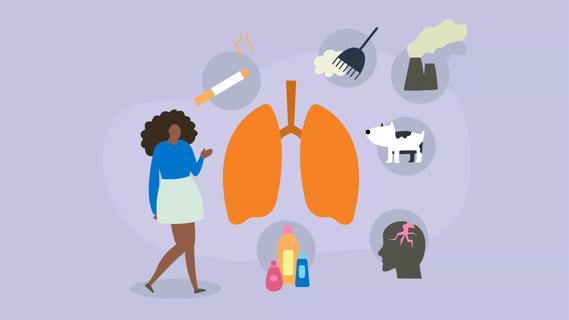Follow these steps to keep your asthma under control

An asthma attack is scary stuff — and living in fear of the next attack is no picnic, either.
Advertisement
Cleveland Clinic is a non-profit academic medical center. Advertising on our site helps support our mission. We do not endorse non-Cleveland Clinic products or services. Policy
Pulmonary medicine doctor Mani Latifi, MD, shares three asthma pitfalls to avoid so those inhales and exhales stay nice and smooth.
Your asthma triggers are unique to you — that’s why every person diagnosed with mild-to-severe persistent asthma should have an asthma action plan. Don’t have one? Then stop right now and message your provider to request one.
If you do, make sure to keep it handy. “Most problems occur when you don’t follow your plan,” Dr. Latifi explains. “Your plan outlines all the do’s and don’ts, so it’s easy to stay one step ahead of an attack.”
The plan is all about maintaining your peak flow rate, which measures how fast air moves out of your lungs, he says. To get this number:
“Don’t wait until you feel symptoms to take a measurement,” Dr. Latifi says. “Be proactive and stay on top of your peak flow to help prevent flare-ups from happening in the first place.”
Your asthma action plan also identifies other ways to keep your asthma in line, like using a rescue inhaler to provide short-term symptom relief and a maintenance inhaler that delivers medicine every day for long-term asthma control.
Advertisement
“If your asthma is severe enough to require daily medications, don’t think ‘I’m fine, I don’t need my inhaler today,’” says Dr. Latifi. “That’s a mistake. Daily controllers like steroid inhalers prevent flare-ups from occurring. They keep airway inflammation — the cause of asthma — under control.”
Once you experience symptoms, your asthma has already started to spiral out of control. Even at this point, many people push off treatment. They may try to ride out the symptoms for a few days and see if the situation improves.
But don’t wait, Dr. Latifi urges: “If you feel symptoms, use your rescue inhaler and contact your provider who may suggest you come in for a treatment. Asthma is life-threatening, so waiting even a few days can land you in the emergency room or a hospital bed.”
He offers two additional tips for asthma medicines:
“Sometimes we don’t know what the triggers are, but with a little extra attention, you and your provider can usually identify what leads to an asthma attack,” says Dr. Latifi. “Whenever possible, your asthma action plan will identify your triggers.”
Common triggers include:
Allergens. An allergic reaction may lead to an asthma attack. Common allergens include:
To combat allergy-triggered asthma:
Irritants. Like with allergens, sometimes an asthmatic reaction can be caused by irritants such as:
“Sometimes the irritants are workplace-related, and you’ll need to identify ways to manage the exposure,” Dr. Latifi says. “You may need to wear a dust mask or respirator to prevent inhaling something that can trigger an attack.”
He also recommends using your weather app to keep tabs on air quality wherever you are: “You might look out and think it’s a beautiful spring day, but when you check the app you find the air quality is low. In that case, minimize the time you spend outside.”
Co-Occurring health conditions. Sometimes, unrelated conditions can trigger asthma. Seasonal allergies like hay fever can cause inflammation in the nose, just like allergens cause inflammation in your lungs.
Advertisement
“Sinus inflammation will frequently trigger asthma,” says Dr. Latifi. “We try and control triggers of sinus problems through medicines, including nasal sprays.”
Gastroesophageal reflux disease (GERD), the backward flow of stomach acids into the esophagus, can irritate the airways and lungs, making asthma worse. Manage GERD (and asthma) with changes like eating smaller meals, raising the head of your bed or using reflux medications.
Even if you have an asthma action plan, don’t forget to stay in touch with your provider. A doctor can help monitor whether your asthma is under control or if you have a serious need that requires attention.
And if you enter the asthma danger zone, don’t dawdle — message your doctor then head to the nearest emergency room for immediate care.
Advertisement
Learn more about our editorial process.
Advertisement

The effectiveness and safety of many of these options are unknown, so it’s best to stick to traditional care

Avoid triggers like dust, smoke and cold air to lessen your chances of coughing

Developmental changes like puberty and menopause can impact symptom severity

Symptoms may lessen over time, but the condition never truly goes away

Being prepared is key when you have asthma

Some tips to make your next fire safer

A rainy day can spell pain and discomfort for many

Key tip: minimize your exposure

Type 2 diabetes isn’t inevitable with these dietary changes

Applying a hot or cold compress can help with pain